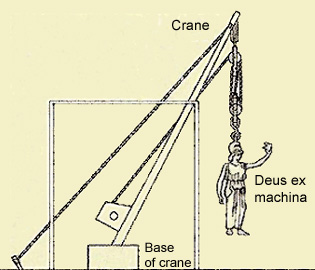We've talked about the deus ex machina in Greek theater a bit in class, but I after reading about the cool-sounding dragon-pulled chariot that Medea rides, I was interested and did a little more research. As a review, deus ex machina is a latin phrase meaning god from the machine and refers to how gods in Greek plays were literally carried by machines to show them flying. Gods often came into the action at the end of plays and resolved lots of issues, so the term has come to mean any unexpected plot device that resolves conflict, often in a somewhat unsatisfying way. In Medea, there is no god who comes into the action, but she is saved by Helios who gives her a chariot so that she can escape Corinth. Over half of Euripides' tragedies employ some sort of deus ex machina, which are used in di
fferent ways. In Alcestis, for example, the main character Alcestis sacrifices herself for her husband, but Heracles comes down from the machine to save her from death. In his play Thesmophoriazusae, Aristophanes has Euripides himself come down from the machine to poke fun at his frequent use of the plot device. Below I included some pictures that I found depicting this interesting institution of Greek theater.







1 comment:
I think this kind of portrayal of the gods is interesting when compared to how we (meaning mostly in the West) view God. A lot of times (but not always) we portray God as this booming voice in the sky, not as a person; usually we try to keep this portrayal as ambiguous as possible (although certainly there are certain lines of thought we cling to, such as God’s voice almost always being masculine). This contrast in portrayal of God/the gods speaks to the differences in how people see divinity. While we see God as transcending human qualities, the Ancient Greeks viewed the gods as beings who were also quite human.
Also, apparently Sophocles used deus ex machina as well, in his play Philoctetes, which I thought was somewhat weird given that we’ve talked about how Aristotle praised Sophocles’ plays but bashed on Euripides for his use of deus ex machina (although he did say that in some sense, Euripides was the “most tragic” of the poets).
Finally:
https://www.google.com/url?sa=i&rct=j&q=&esrc=s&source=images&cd=&ved=0ahUKEwiikcT59eTWAhVIiVQKHTXqDzUQjRwIBw&url=https%3A%2F%2Fgiphy.com%2Fgifs%2Fmorgan-freeman-bruce-almighty-J4JN1fW9HsOHu&psig=AOvVaw3OdbcnmVnF4d-Zc_WhuhB5&ust=1507685939681934
Post a Comment